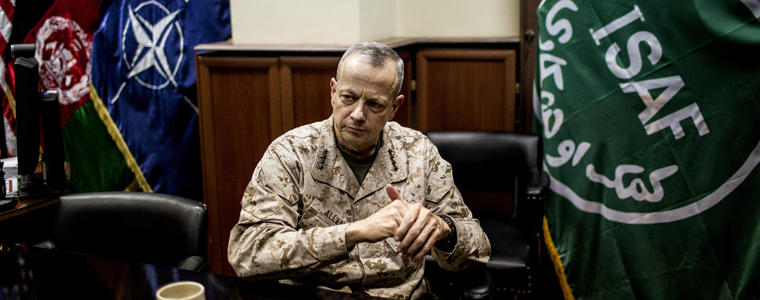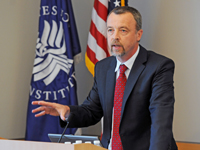Gen. John Allen's Testimony and the Way Ahead in Afghanistan
On the Issues with Andrew Wilder
A Q&A with USIP's Andrew Wilder on Afghanistan, reconciliation and moving past recent challenges.

The top U.S. commander in Afghanistan told Congress today that the U.S. is “on track” and intends to stick to its strategy of a steady and responsible transition in Afghanistan, including the planned withdrawal calendar, despite recent setbacks that have made the relationship between the U.S. and Afghanistan increasingly complex. Gen. John Allen said that while the last few months have been difficult, the coalition and its Afghan allies have made real, sustainable progress against the insurgency.
General Allen was before the House Armed Services Committee Tuesday and will go before the Senate on Thursday. “I assure you that the relationship between the coalition and our Afghan security forces remains strong,” he said.
As the focus remains on security transition, USIP is working to promote a peaceful and democratic political transition in Afghanistan. USIP’s Andrew Wilder attended a background briefing at the White House Monday evening. USIP spoke with Wilder about the testimony.
 Q: What do you believe General Allen and the Obama administration are trying to achieve now in Afghanistan and how do recent events including the Koran burning affect that mission?
Q: What do you believe General Allen and the Obama administration are trying to achieve now in Afghanistan and how do recent events including the Koran burning affect that mission?
AW: General Allen and the Administration are emphasizing that while the Koran burning and the massacre of Afghan civilians by a U.S. soldier were both terrible incidents, they have not and will not affect the U.S.’s core mission of disrupting, dismantling and eventually defeating al-Qaida. General Allen during his testimony, and senior administration officials at a background briefing I attended at the White House on Monday, both emphasized the considerable progress that has been made in this regard.
They are concerned that all the bad news from Afghanistan is increasing public sentiments to head for the exits as quickly as possible, and that too hasty a departure would be very destabilizing and undermine the core mission. General Allen in his testimony was clearly making a case to stay the course in Afghanistan, and not to let recent events dictate strategy or alter the current timeframe of withdrawing most troops by the end of 2014. However, despite General Allen’s preference for a gradual reduction, there continues to be considerable ambiguity regarding the pace at which the remaining troops in Afghanistan will be withdrawn.
Q: How will this transition to the Afghan National Security Forces taking lead responsibility for security work? What is General Allen’s plan for troops?
AW: The November 2010 NATO Summit in Lisbon outlined the strategy for transitioning lead security responsibility from international forces to the ANSF by the end of 2014.
This transition is taking place in phases, with several provinces and cities (including Kabul) already transitioned to Afghan forces. Last month, Defense Secretary Panetta announced that the mission for NATO/ISAF forces would shift from a primarily combat mission to a training mission, with U.S. trainers embedded within the ANSF. This shift would occur in late 2013, but the timeframe for finalizing the transition to ANSF and withdrawing most foreign troops remains the end of 2014.
There are, however, many major risks associated with this security transition process. First of all, the increasing number of international forces killed or injured by members or infiltrators of the ANSF has significantly undermined the trust levels necessary for an effective embedded trainers program. A second concern is about who will pay for the very significant costs (currently estimated at about $4 billion) of sustaining the ANSF after most international forces have left. I also am concerned about the political sustainability of the ANSF as many Afghans fear that the Afghan National Army and Afghan National Police could fairly quickly fragment along ethnic lines and become future forces for instability rather than stability.
Q: Do you think this strategy will work and will it lead to some kind of “reconciliation” process or will this Afghanistan situation simply descend into more ethnic chaos?
AW: The focus of General Allen’s testimony today was not surprisingly on the security transition in Afghanistan. However, of equal importance for stability in Afghanistan is the major political transition that also needs to take place in 2014. There are two main components to this political transition.
The first is the process of trying to engage the Taliban in a peace and reconciliation process that could eventually lead to the reconciliation of some Taliban groups. This effort has received greater visibility following the moves to open a Taliban office in Qatar to facilitate negotiations, as well as the recent announcement by the Taliban that they are suspending talks – a move that most analysts interpret as a negotiating tactic. The initial focus of the reconciliation process has been on promoting confidence building measures rather than on more substantive discussions on power-sharing arrangements, which the U.S. insists must be Afghan-led discussions.
From the outset the Obama administration has made clear that for any reconciliation process to be acceptable, the Taliban must respect the “red lines” of severing ties with al-Qaida, renouncing violence, and respecting the Afghan Constitution, including its provisions protecting the rights of women and minorities.
The second component of the political transition is the 2014 presidential election, which due to the Afghan Constitution’s two-term limit President Karzai cannot contest. So, in the midst of trying to finalize the security transition to the Afghan National Security Forces and withdraw most international forces, Afghanistan must also manage an election and try to make the first peaceful and democratic transition from one leader to another in the country’s history.
Unfortunately, this potentially very destabilizing political transition gets relatively little policy attention relative to the security transition. The international community led by the U.S. needs to publicly and forcefully signal its support for democratic forces in Afghanistan, for a credible election, and for a peaceful and democratic political transition in 2014.



